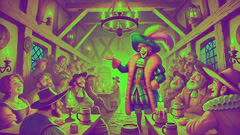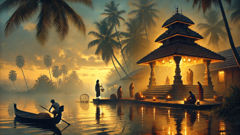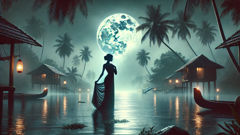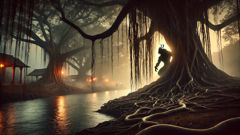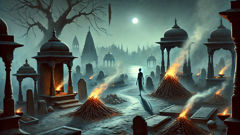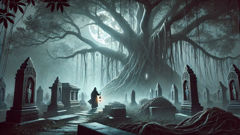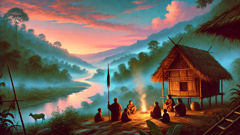Introduction
In the heart of eighteenth-century Germany, where the forests stretch dark and mysterious and the rivers wind through ancient villages, there lived a nobleman whose name echoed like a promise of laughter and the extraordinary: Baron Hieronymus Karl Friedrich von Munchausen. He was a man whose very presence seemed to invite the impossible. The Baron was known far and wide, not just for his extravagant attire—plumed hats, velvet coats, boots polished to a shine—but for the tales he spun with a twinkle in his eye and a mischievous grin curving his lips. In crowded taverns and candlelit salons, by roaring fires or beneath the soft gold of summer sunlight, he would regale his audiences with stories so grand and preposterous that only the most imaginative dared to believe. For Baron Munchausen’s adventures were not bound by the laws of nature or the limits of geography. He claimed to have ridden cannonballs across battlefields, outwitted sultans in distant lands, and dined with the Sultan on the Moon. He spoke of wrestling sea monsters, racing against wolves in the snowy Russian wilderness, and retrieving his own head after it had been separated from his body in a duel. Was he a hero, a trickster, a dreamer, or simply a man who saw the world through the lens of endless possibility? Perhaps he was all these things and more. His stories were not merely for amusement; they were declarations of defiance against the mundane, celebrations of wit, courage, and the power of imagination. Each tale—told with dramatic flourishes and impeccable timing—drew listeners into a world where the improbable became reality and laughter reigned supreme. And so, in this collection, we journey alongside Baron Munchausen as he traverses deserts and forests, courts and battlefields, always propelled by an unyielding zest for life and a boundless gift for invention. These are his adventures, woven from the fabric of dreams and daring, waiting to transport you into the realm where only the boldest storytellers and their most enchanted audiences ever dare to go.
Riding the Cannonball: An Exploit of Audacious Bravery
It was during the height of the Austro-Turkish wars when Baron Munchausen’s legend first began to burn with the bright flare of cannonfire. The Baron, then an officer in the Imperial cavalry, found himself stationed at the besieged fortress of Belgrade. The city shuddered beneath relentless bombardment; smoke curled above shattered ramparts, and the thunder of guns rattled the very stones. Munchausen was never one to shrink from chaos. One morning, as the Ottoman artillery launched a particularly ferocious barrage, he stood atop the parapet, squinting through the haze with a look of pure delight. “What a splendid morning for flying!” he declared to his men, who stared at him as though he’d gone mad.
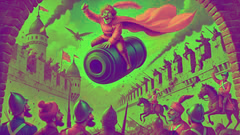
Between orders, as cannonballs soared overhead, the Baron’s mind whirred with mischief. He wagered a bottle of Hungarian Tokaji that he could leap further and faster than any horse or artillery shell. His companions, desperate for a distraction from the siege’s monotony, eagerly accepted. With a flourish, Munchausen strode to the nearest battery, where a particularly large cannon waited, primed and ready. He saluted the gunner, removed his hat, and—before anyone could stop him—climbed astride the cannonball as if it were a trusty steed. The soldiers stared, dumbfounded. Then, with a bellowed order, the cannon fired.
The sensation was unlike anything Munchausen had known. The world blurred past, smoke and wind roaring in his ears as he clung to the smooth iron. He saw the battlefield below—men and horses, tents and trenches—shrinking rapidly as he soared higher, arcing over the enemy lines. The air thinned, and the sun shone fierce and unfiltered. The Baron, ever resourceful, produced a handkerchief from his pocket and tied it over his face to shield against the chill. He glanced down to see Turkish soldiers scattering in disbelief, their hats flying from their heads as they pointed at the sky.
Mid-flight, the Baron realized he was on a collision course with a distant minaret. With a deft twist of his body—years of equestrian experience serving him well—he shifted his balance, tilting the cannonball’s trajectory just enough to clear the spire by a hair’s breadth. He waved jauntily at the muezzin, who gaped in astonishment from the balcony. As the cannonball began its descent, Munchausen considered how best to land without breaking every bone in his body. Spotting a flock of geese flying in formation below, he waited for just the right moment, then leapt from his unlikely mount and seized two birds by their necks.
Suspended by flapping wings and startled honks, he glided gently to earth—landing, quite by accident, in the Sultan’s private garden. Palace guards rushed at him, scimitars drawn, but the Baron, never at a loss for words, bowed low and presented the Sultan with a single, still-warm goose egg, claiming it as a token of peace. The Sultan, amused and intrigued, ordered his men to lower their blades and invited Munchausen to dine that evening. Over platters of spiced lamb and honeyed figs, the Baron regaled the court with his tale, embellishing here and there for dramatic effect. By morning, word of his flight had spread across continents, and Munchausen’s name became synonymous with fearless invention. Months later, when he returned to his regiment, he collected his bottle of Tokaji with a wink and a flourish. His men never doubted him again—at least, not openly.
The Moon Voyage: Dinner with the Sultan of the Stars
After his legendary cannonball escapade, Baron Munchausen’s appetite for adventure only grew. He became a guest of courts from Vienna to Constantinople, delighting kings and sultans with his stories. Yet, it was an evening under a full moon, during a masquerade at the Elector’s palace in Dresden, that set him on perhaps his most unbelievable journey. As the clock struck midnight and fireworks blossomed against the sky, Munchausen found himself deep in conversation with an enigmatic astronomer who claimed to have built a chariot capable of reaching the heavens.
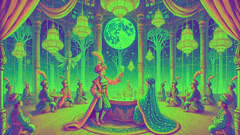
The Baron, thrilled by the prospect, agreed to accompany the astronomer on a lunar expedition. Together they ascended a spiral staircase to the palace’s tallest tower, where a peculiar contraption awaited: a gilded sleigh drawn by six white swans, their harnesses strung with bells of silver. With a mighty tug on the reins and a shout that echoed across the city, the sleigh soared skyward. The earth receded into a swirl of clouds and stars, and the cold air shimmered with the music of celestial spheres.
The journey was dizzying. They crossed the path of shooting stars and sailed past clouds shaped like ancient gods. At last, they landed in a forest of silver trees on the far side of the moon. The lunar landscape sparkled with frost and strange, glowing flowers. Towering above all was a grand palace of crystal, its windows lit from within by a soft blue glow. The Sultan of the Moon welcomed them—an ethereal figure draped in robes woven from stardust. His court was filled with beings of every description: jesters with comet-tails, wise men who spoke in riddles, and musicians whose instruments sang without strings.
The banquet was a marvel. Dishes floated on platters that hovered in mid-air; goblets refilled themselves with sparkling nectar distilled from lunar dew. The Sultan listened with delight as Munchausen recounted his earthly adventures, and in return, told tales of cosmic mischief. For entertainment, a troop of moon-mice performed acrobatics along beams of moonlight, and the Baron himself was persuaded to join in a dance that left him spinning, weightless and giddy.
But trouble was never far. As the revels grew wild, a rival noble—a jealous Duke of the Dark Side—challenged Munchausen to a contest of wit. The two traded riddles and outlandish boasts until the Duke, in a fit of pique, declared that Munchausen must find and return the Moon’s lost silver key or remain stranded among the stars forever. Never one to shrink from a challenge, the Baron embarked on a quest across lunar valleys and mountain peaks. With the help of a talking owl and the guidance of a constellation that blinked in Morse code, he discovered the key hidden beneath a sleeping volcano of sapphire.
Triumphant, Munchausen returned to the palace. The Sultan, overjoyed, awarded him a medal shaped like a crescent moon and granted him one wish. Without hesitation, the Baron wished to return home—but with a pocketful of lunar cheese and a bottle of stardust wine to prove his journey was no mere tale. In a flash of swirling light, he found himself back in the palace’s tower in Dresden, the astronomer vanished like a dream, but the medal and cheese still in his coat. To this day, whenever the moon is full and bright, Baron Munchausen’s laughter can be heard drifting on the night wind—proof, perhaps, that some dreams are real after all.
Conclusion
Baron Munchausen’s adventures blur the line between the possible and the fantastical, yet at their heart lies something unmistakably true: a spirit that refuses to be limited by reality’s boundaries. Through every improbable flight, impossible contest, and dazzling escape, the Baron invites us to see the world not as it is but as it might be—rich with wonder, humor, and unquenchable courage. His stories, told and retold across generations, are not just entertainment but reminders that imagination is the mightiest force of all. To listen to Munchausen is to remember that laughter has power, that boldness can change one’s fate, and that sometimes the most outlandish tales contain the deepest truths. So whenever you hear a story that seems too extraordinary to be real, pause a moment and smile—for perhaps, somewhere, the Baron himself is tipping his hat and inviting you to join him on his next great adventure.

